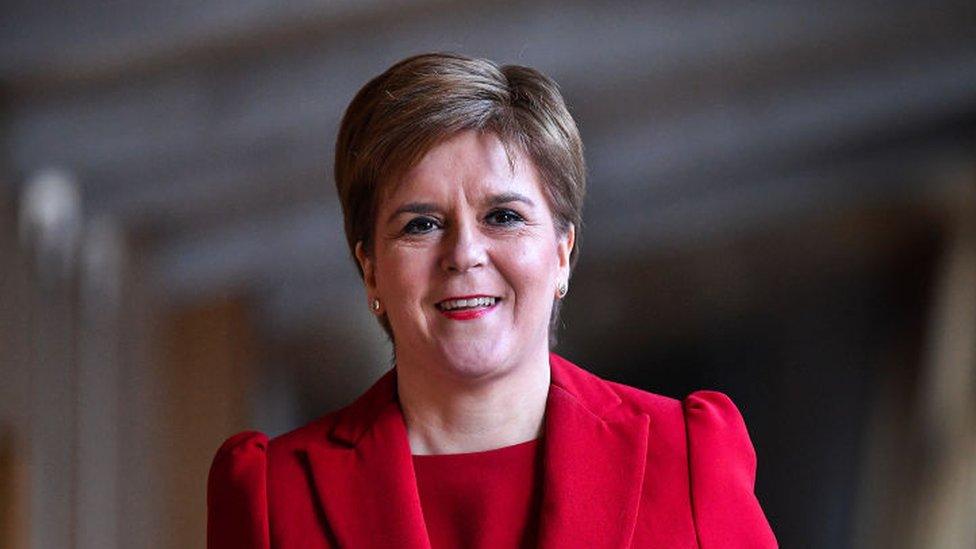Could Alex Salmond bring down Nicola Sturgeon?
- Published
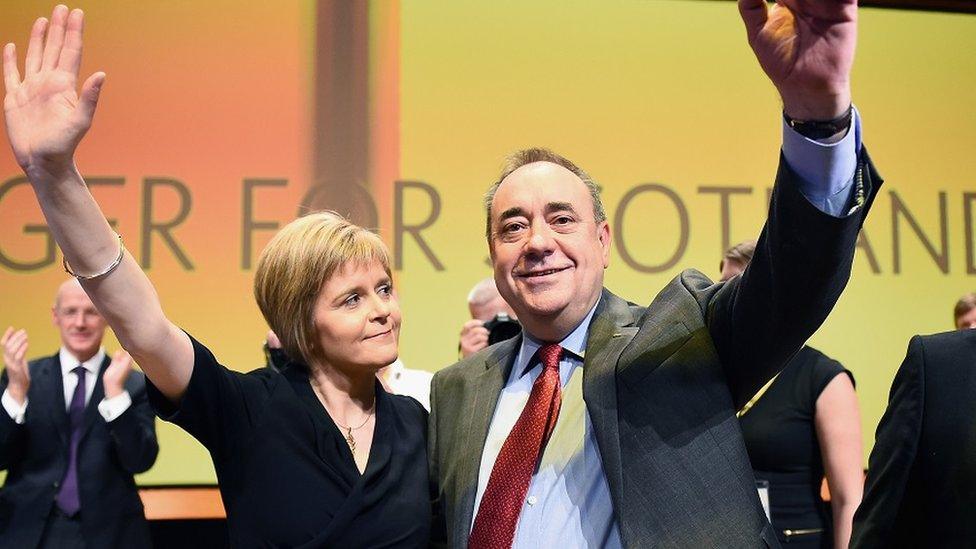
Alex Salmond has accused Nicola Sturgeon of breaking the ministerial code and misleading parliament.
He believes senior people around Scotland's first minister were part of a malicious attempt to have him removed from public life and ultimately jailed.
Ms Sturgeon has dismissed the claims and said he has no evidence.
The crisis could have significant implications for Scottish politics.
"He's trying to bring the house down." That was the conclusion of one of Ms Sturgeon's close allies shortly after it emerged Mr Salmond was publicly accusing her of misleading the Scottish Parliament and breaking the ministerial code.
For months, some around Scotland's first minister hoped Mr Salmond would hold back from directly criticising Ms Sturgeon in a way which could threaten her job.
They believed directly attacking Ms Sturgeon would alienate supporters of Scottish independence - something Mr Salmond would want to avoid.
That calculation changed with Mr Salmond's submission to an inquiry into whether Ms Sturgeon broke the ministerial code.
How we got here

The picture above was taken days before the Scottish independence referendum in 2014, when Mr Salmond and Ms Sturgeon were the dream team of the pro-indy movement.
For a decade, as leader and deputy leader, the pair had dominated nationalist politics.
When Mr Salmond stood down, there was no question of who would take over: Ms Sturgeon was the natural successor.
That relationship collapsed completely as a result of sexual allegations later made against Mr Salmond.
When the complaints emerged, Mr Salmond successfully took Ms Sturgeon's Scottish government to court over its process for investigating him. That process, it was found, was unlawful and "tainted by apparent bias".
Mr Salmond's victory cost the taxpayer at least £500,000.
The former first minister then stood trial accused of sexual assault - and was cleared of all charges.
Now it is Ms Sturgeon and her government facing questions over the handling of complaints against Mr Salmond.
The former first minister of Scotland has made extraordinary allegations against the Scottish government and SNP - two institutions he used to lead.
He has claimed the process set up by the Scottish government, under which he was investigated, was unfair.
Mr Salmond alleges there was a malicious and concerted effort among a range of individuals to damage his reputation - and even to have him sent to jail.
He names people he believes helped to damage his reputation - including Ms Sturgeon's husband, the SNP chief executive Peter Murrell and her Scottish government chief of staff, Liz Lloyd.
And he has made serious allegations against the first minister too, arguing she has not told the truth about meetings with him, that she misled parliament and that she broke the code which governs the behaviour of ministers.
The meeting
A lot of the controversy surrounds what Ms Sturgeon knew and when - and accounts she gave publicly.
Ms Sturgeon originally said she first found out about a complaint against Mr Salmond, being investigated by her Scottish government, on 2 April 2018.
That meeting took place in her home and was not recorded.
But it has since been claimed Ms Sturgeon was told a few days earlier at the Scottish Parliament by Mr Salmond's former chief of staff.
That's raised questions over what Ms Sturgeon knew, why she met Mr Salmond privately and why it wasn't recorded as official government business.
It is not simply a question of a few days difference - it is a question of whether the second meeting should have been reported and treated as Scottish government businesses if Ms Sturgeon had indeed known what it was about in advance.
My colleague Phil Sim has written about the ins and outs of meetings here.
Mr Salmond has also made claims that Ms Sturgeon breached the ministerial code by not conceding earlier that the Scottish government's process for investigating him was flawed.
He alleges it was clear the Scottish government would lose a judicial review months before it was conceded it court - something which cost the taxpayer money.
'Misled'
There are two inquiries into the Scottish government's alleged mishandling of complaints against Mr Salmond.
One is by James Hamilton, the first minister's independent adviser on the ministerial code, into whether she has breached it.
The second is a cross-party Holyrood inquiry into how her government handled complaints about Mr Salmond.
This has been beset by legal difficulties - with significant delays to Mr Salmond's evidence being published. After senior MSPs decided it should be made public, the Crown Office, Scotland's public prosecution service, raised concerns which led to further changes.
Mr Salmond has accused Ms Sturgeon of holding positions which are "simply untrue", "manifestly untrue" and "untenable".
"Parliament has been repeatedly misled," Mr Salmond contends.
There are many in the SNP - including a small but loyal group of elected politicians - who believe there was a conspiracy against him which could lead to several key officials in the Scottish government and SNP standing down.
Some include Ms Sturgeon in that group.
'False conspiracy theories'
Ms Sturgeon says this is all nonsense and denies breaking the ministerial code.
Her spokesman has accused Mr Salmond of trying to deflect from complaints made by women about his behaviour - and accused her former mentor of "spinning false conspiracy theories".
Ms Sturgeon said this week: "He appears to be suggesting some kind of conspiracy or concerted campaign against him, without a shred of evidence.
"If he can't substantiate it, it's time for him to stop making these claims."
Sturgeon on trial?
Nicola Sturgeon's political opponents have struggled to land any political blows in recent months.
Polls suggest support for the SNP is as high as ever - and that backing for Scottish independence has been rising.
Although there have been criticisms of the Scottish government's handling of the pandemic, polling suggests Scots are happy Ms Sturgeon is making the decisions - and not Boris Johnson.
To many in Scottish politics, it appears the biggest threat to Ms Sturgeon's position now comes from her predecessor.
Mr Salmond's claims that his one-time protégé failed to tell the Scottish Parliament the truth - and that she broke the ministerial code - are serious.
In normal times such a breach of the code would lead to a resignation.
The code is clear: "Ministers who knowingly mislead the parliament will be expected to offer their resignation."
Ms Sturgeon's political opponents have insisted that if she is found to have breached the code, she will have to stand down.
Privately, although they're confident it won't come to that, some around the first minister have admitted she would not be able to survive such a finding from her adviser on the code.
Many senior figures in Scotland in the devolution era have resigned for less.
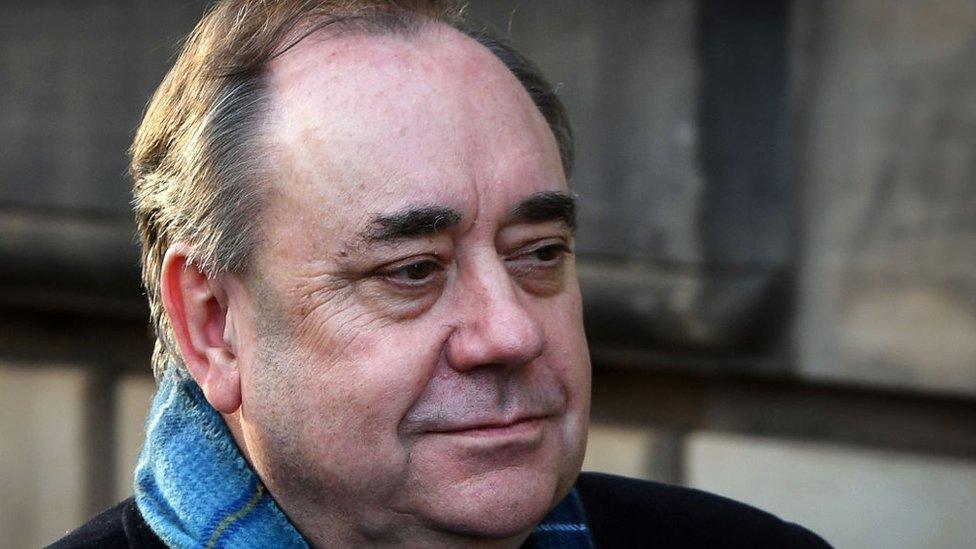
There is also nervousness in the SNP about the impact of these allegations hitting the headlines just weeks ahead of the Scottish Parliament elections.
Although most would argue that the public just isn't paying attention, some acknowledge a number of party activists side with Mr Salmond - as do a section of SNP voters.
If the SNP are going to win a majority, they will need to mobilise their support ahead of 5 May.
Some are worried this situation - combined with increasingly public splits on other issues - might turn some voters off, and lead to some activists staying at home.
Is the first minister in trouble?
For months, well connected opposition figures have talked about this inquiry being a moment of real danger for Ms Sturgeon's leadership.
They believe it raises questions about whether her government can be trusted.
But while many in Scottish politics discuss Ms Sturgeon's future - very few people are confidently predicting her demise.
The main reason is the pandemic.
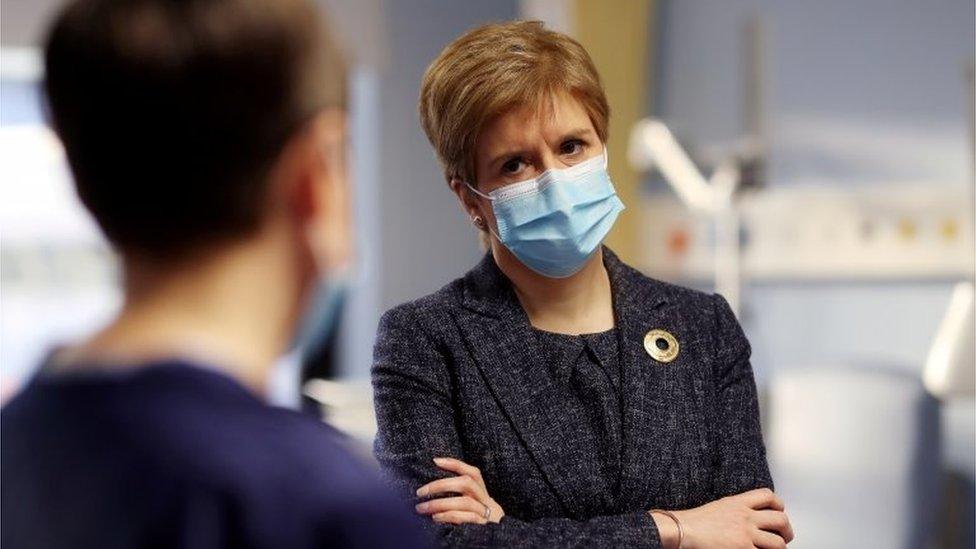
Ms Sturgeon has high approval ratings for her response to the coronavirus pandemic.
Scots seem to approve of the way she is trying to deal with the health emergency - and some believe voters would forgive a breach of the rules in the midst of a crisis.
It's a view I've heard from Ms Sturgeon's critics as much as her allies; that these are not normal times and the normal rules of politics don't apply.
Mr Salmond's supporters are reluctant to speak on the record.
I'm told that some elected parliamentarians are afraid of the backlash they would get if they did.
But one source said: "I think in normal times she would be a goner. But I don't think she is a goner because people are rightly focused on the pandemic and her handling of the pandemic has been great."
The second is independence.
Ms Sturgeon has led the SNP and the independence movement to a point where successive polls have suggested support for leaving the UK is now a majority view.
If the SNP win big in May, they will use it to demand another referendum, which many think they could win.

An independence supporter following the referendum in 2014
There have been criticisms from some in the SNP about a lack of strategy to force another referendum, but most accept the first minister is a key asset for the independence movement. Many think she is one of the main reasons for increasing support for leaving the UK.
If the SNP lost its leader that could have an impact on support for independence.
While a number of names have been discussed, there is no certain successor - definitely not with the same UK and international profile.
Mr Salmond's evidence to the Holyrood inquiry will be a remarkable moment in the history of the SNP; the leader who took the party to the brink of independence accusing the leader who could deliver it of misleading parliament.
Even if Ms Sturgeon survives, Mr Salmond's allies believe others may be "toast"; including senior civil servants and advisers.
But senior allies of Ms Sturgeon still appear confident she will lead them into the next Scottish election and beyond.
One concluded: "Is she going to get through this? Yes she is."
Related topics
- Published8 January 2021
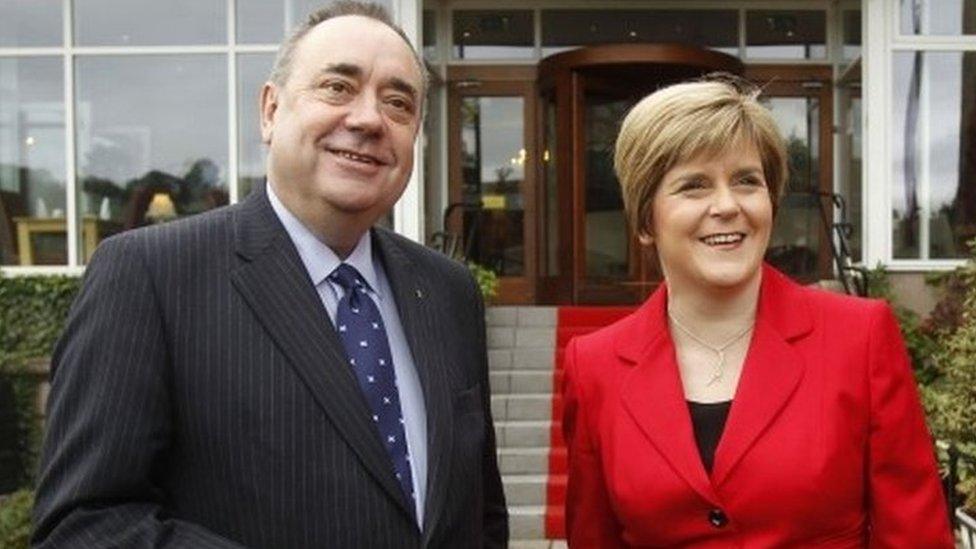
- Published10 November 2020

- Published21 February 2020
